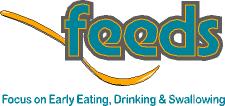FEEDS study
FEEDS Toolkit
Since completing the FEEDS study (summary of findings below) the FEEDS team have created the FEEDS Toolkit for use in health care. If you would like to read about the FEEDS Toolkit please follow this link.
Participant Newsletter March 2021 PDF 101Kb
Please click on the FEEDS Study newsletter pdf above for a brief summary of our study
Our report summarising the study has been published.
To read a summary for parents and non-health professionals go to: https://www.journalslibrary.nihr.ac.uk/hta/hta25220/#/plain-english-summary
To read a summary for health professionals go to: https://www.journalslibrary.nihr.ac.uk/hta/hta25220/#/scientific-summary
To read the full report go to: https://www.journalslibrary.nihr.ac.uk/hta/hta25220/#/abstract.

Background to the study
Young children with developmental difficulties may have eating, drinking and swallowing problems. Eating and drinking difficulties may lead to a restricted diet, poor growth, and impact on development. For some children there are specific physical health risks such as choking or chest infections. The difficulties may also create stress at mealtimes that can affect wider aspects of family life.
Some young children have mostly physical difficulties; for example, those with cerebral palsy may find chewing and swallowing problematic. Other young children have mostly sensory difficulties, such as sensitivity to certain foods, or difficulties associated with not wanting to eat or eating only a restricted range of foods, such as in children with autism. Some children have combinations of difficulties.
A team of health professionals usually works with parents and carers of young children with eating and drinking difficulties. The professionals identify the cause of the child’s difficulties and suggest to parents how eating and drinking might be improved. This could include adjusting posture, reducing the child's sensitivity to certain textures, using medication, or special equipment. The treatments suggested depend on the cause of the child’s difficulty.
There was no strong evidence on whether the treatments suggested by professionals actually worked, so we needed to conduct careful research to understand whether they are effective. As a first step, we needed to find out which treatments are regularly recommended, which types of improvement in eating and drinking were considered most important by parents and professionals, and how best to measure a child’s progress. This would help us to decide which treatments should be tested in a future study and how to assess whether they work.
Study overview
The FEEDS review (Focus on Early Eating Drinking and Swallowing review) aimed to find out about the services currently offered to families of children with eating, drinking and swallowing difficulties by NHS services. We then wanted to gather information in order to plan a future study of one or more potentially worthwhile treatments.
Using discussion groups and surveys with parents and professionals, we found out the different treatments recommended for young children with eating and drinking difficulties and how acceptable they were to parents. We also asked how we should measure improvements in a child’s eating and drinking and other related areas that are important to families; and how long after the treatments have been started we should assess success. Then we examined the published research literature to see what is currently known about the effectiveness of treatments people think could be important. We then combined all the information to identify whether there were treatments that were worth investigating further, and how best to measure children’s progress with eating and drinking. We met again with parents and professionals, and met young people who had experienced eating and drinking difficulties, to see whether we could agree how to test treatments in further research. Finally we made recommendations about how future studies should be designed and conducted.
Conclusions
- High quality research evidence is lacking on effective interventions for EDSD and robust tools to measure outcomes
- The research team are developing the FEEDs Intervention Toolkit for use with children with neurodisability and EDSD
- Parents and professionals thought that implementation of the FEEDS Intervention Toolkit as part of usual practice would be a positive step
- Further operationalisation of the FEEDS Intervention Toolkit is needed, including an evaluation of the feasibility and acceptability of its use in clinical practice and in the home environment by parents and subsequent evaluation of its effectiveness
- There are a number of challenges for future clinical trials of a toolkit of interventions, for example the range of interventions that children in a comparator group might receive
- The findings can be used to support service development for parents and children with neurodisability and also by funders to consider whether to commission further research including trials of interventions.
Who was involved in this study?
The Principal Investigators for this study were
Jeremy Parr
- Professor in Paediatric Neurodisability
- Honorary Consultant Paediatrician, Newcastle upon Tyne Hospitals NHS Foundation Trust
- Email: jeremy.parr@ncl.ac.uk
- Tel: 0191 282 5966
- Studies: Adult Autism Spectrum Cohort-UK; ASD-UK; Daslne; FEEDS study; Improving the Health of Older Autistic People; Methods of Diagnosis for ASC in Adults; PAT-A; Transition
- Recently Completed Studies: MeASURe; Measuring Anxiety in ASD; WHOQOL-BREF and Autistic Adults
Lindsay Pennington
- Professor of Childhood Disablity
- Speech and Language Therapist
- Email: lindsay.pennington@ncl.ac.uk
- Tel: 0191 282 5966
- Studies: Communication Development and Cerebral Palsy, E-SALT, FEEDS study; Fidelity
- Recently Completed Studies: Sparcle 1, 2
Also involved in the project from the Neurodevelopment and Disability team are:
Allan Colver
- Professor of Community Child Health and Strategic Research Advisor
- Honorary Consultant Paediatrician, Northumbria Healthcare NHS Foundation Trust
Helen McConachie
- Strategic Research Adviser
- Professor of Child Clinical Psychology
Helen Taylor
- Clincial Research Associate
Also involved from outside the team are:
- Dawn Craig (Principal Scientist (Evidence Synthesis))
- Elaine McColl (Professor of Health Service Research)
- Charlotte Buswell (Specialist Paediatric Speech and Language Therapist, Newcastle upon Tyne Hospitals NHS Foundation Trust)
- Jill Cadwgn (Consultant in Paediatric Neurodisability, Guys' and St Thomas's NHS Foundation Trust)
- Julian Thomas (Consultant Paediatric Gastroenterologist, Great Ormond Street Hospital for Children NHS Foundation Trust)
- Diane Sellers (Specialist Speech and Language Therapist, Sussex Community NHS Foundation Trust)
- Chris Morris (Senior Research Fellow in Child Health, Peninsula Cerebra Childhood Disability Research Unit (PenCRU))
- Deborah Garland, Lead for the National Autistic Society in the North East
- Johanna Smith, Patient and Public Involvement, Newcastle University
- Morag Andrew, Consultant Community Paediatrician
More information
We’d be interested to hear from you!
Please do contact us if you are interested in this research. You can do that by contacting Helen Taylor by emailing: FEEDS@ncl.ac.uk
Or you can telephone 0191 282 1379
Other research
The FEEDS Review sits within the 'Clinical service development' and the 'Effects and acceptability of interventions' research themes.
If you are looking for other research linked to ASD, Cerebral Palsy incl. Hemiplegia or Childhood Neurodisability, please view the relevant conditions and topics page for a full list of studies.
